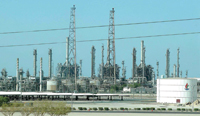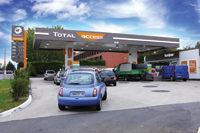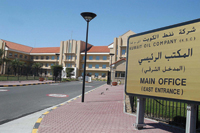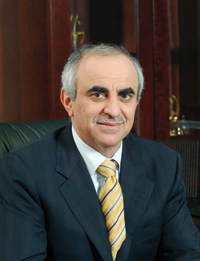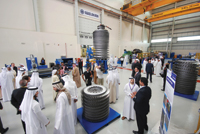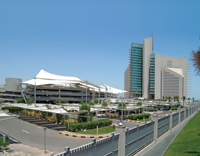
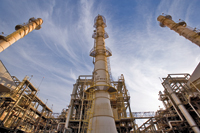 Equate ... planning a third olefins cracker
Equate ... planning a third olefins cracker
THE petrochemical sector in Kuwait has expanded despite the global recession and losses incurred by producers in various parts of the world.
Expansion of basic petrochemical production in the Middle East has drawn to a close and attention is moving further downstream. There are two driving factors. First demand for plastic products in the region is rising rapidly in line with disposable incomes and an expanding industrial sector, offering the opportunity to add value to hydrocarbon resources domestically rather than exporting basic petrochemicals and later re-importing them as finished and semi-finished goods, analysts say.
Secondly, the conversion industry is highly labour intensive helping to curb unemployment. This shift downstream is being further encouraged by the lack of low-cost ethane gas in the region. As petrochemical producers turn to using mixed feeds, the product slate expands into speciality chemicals, which lend themselves to supplying domestic industries.
Although the region will remain one of the world’s leading exporters of basic petrochemicals, in the long term, the amount of imported plastics is gradually to decrease as its conversion industry develops and becomes more sophisticated.
Kuwait is acutely short of natural gas, due to a rapid rise in local demand for electric power generation. If its gas supply issues can be resolved, there will be a good outlook for the emirate’s petrochemical sector; but ambitious expansion is unlikely in the near future.
 |
|
PIC ... expanding capacity with new products |
Only $3.7 billion will be invested in Kuwait’s basic petrochemical projects. These will consist of the Equate’s third olefins cracker – Olefins-III – to produce 1.7 mtpy of ethylene and to cost $3 billion; and a $700 million complex to produce 240,000 tpy of polyethylene (PE) terephthalate (PET) and 400,000 tpy of purified terephthalic acid (PTA).
The cracker, to produce ethylene glycol (EG) and PE, will be owned by the Petrochemical Industries Co. (PIC – a unit of the state-owned Kuwait Petroleum Corp – KPC), Dow Chemical, the local Boubyan Petrochemical Co and the local Qurain Petrochemical Industries Co. A feasibility study by Jacob Engineering of the US is to be completed before end-June 2011. An EPC contract is to be awarded in the fourth quarter of 2012 and the complex is to be on stream in the second quarter of 2016.
The PET/PTA project will be owned by the local United Industries Co. A feasibility study is being done by PCI Consulting Group of the US. The EPC contract will be awarded in the second quarter of 2012 and the two-unit plant should be on stream in the second quarter of 2015.
Equate operates two crackers, Olefins-I & Olefins-II, which started the emirate’s relatively young petrochemical sector. The JV is owned by the same companies mentioned for Olefins-III. The establishment of Equate at Shuaiba in 1997 was PIC’s first JV with Dow. On the back of its success, the partners launched Equate-II, integrating the Kuwait Olefins Company, the Kuwait Styrene Company and Kuwait Paraxylene Production Co, to produce a total of more than 5 mtpy of petrochemical products. Equate II’s 600,000-tpy ethylene glycol plant, the largest single train in the world, came on stream in August 2008, followed by a second ethane steam cracker in November 2008. This took its ethylene capacity to 1.7 mtpy.
Dow and PIC have not always agreed on the terms of business. In December 2008, the partners fell out, bringing down one of the petrochemical sector’s biggest deals and putting a serious dent in Kuwait’s ambitions. The K-Dow deal, which was cancelled from the Kuwaiti side, would have involved Kuwait taking a 50 per cent stake and investing more than $7.5 billion in one of the largest polymer producers in the world, with projected annual sales of about $15 billion.
The total value of K-Dow was expected to be $17.4 billion. It looked like a formidable alliance, building on a ready supply of low-cost feedstock, combined with industry expertise and market reach, to create a globally competitive and fully integrated producer. After almost a year of planning, the K-Dow deal was announced and then swiftly cancelled. In December 2008, Kuwait’s Supreme Petroleum Council (SPC), the country’s highest decision-making body for KPC projects, withdrew its approval for the deal. Opposition MPs argued that KPC was over-paying on its $7.5 billion investment, as the value of Dow’s assets had plummeted because of the global financial crisis, and the US giant was unloading some of its ageing assets, with some plants more than 40 years old.
After the collapse of that deal, Dow entered arbitration proceedings, seeking more than $2.5 billion in damages. A decision is expected later this year. But the collapse of the K-Dow deal dealt a serious blow to PIC’s hopes of becoming a leader in the global petrochemical industry.
The failed investment was not the only problem facing the sector. The limited range of petrochemicals produced in the country and a shortage of gas represented more serious challenges to Kuwait’s future growth plans.
Its petrochemical strategy depends on progress being made with its refining expansion programme, which aims to create the extra capacity and naphtha feedstock needed to boost petrochemical output. The lack of integration between its ageing refineries and downstream plants has resulted in the current low-value production slate.
Refinery and petrochemical integration is not just an option, but has become a necessity. Bakhit Al Rashidi, deputy managing director of planning and local marketing at KPC’s local refining unit Kuwait National Petroleum Co (KNPC), says: “Cyclical trends in refining margins and a thin band of margin operation for overall profitability make integration essential to even out the margin vagaries. All new refinery projects incorporate integration with petrochemicals as much greater savings in investment cost and operating costs result”.
Political wrangling over control of the petroleum sector has led to increasing delays on upstream refinery projects, which have hampered the development of Kuwait’s petrochemical industry. KNPC’s 615,000 bpd Al-Zour refinery is a case in point. Designed as the world’s largest refinery, it was originally meant to be completed by end-2010, but the project is now close to approval. The refinery is to play a crucial role in providing naphtha feedstock for the petrochemical sector.
Dubai-based MEGlobal, another US-Kuwait JV, is exploring options to expand its monoethylene glycol (MEG) production capacity, although questions over feedstock supplies remain. The company is looking to new technologies to resolve this issue, considering methanol, biofuel and even coal-based olefins production. Gas supplies, particularly in Kuwait, will be difficult to source, but MEGlobal says it is hopeful it will be able to expand MEG production in the country.










































































